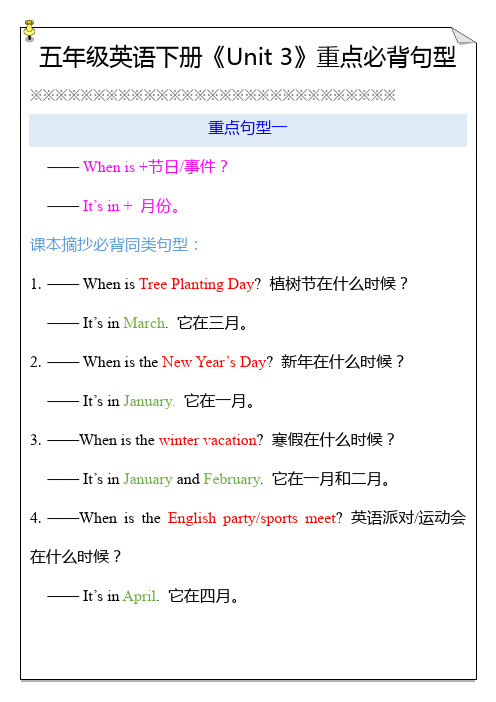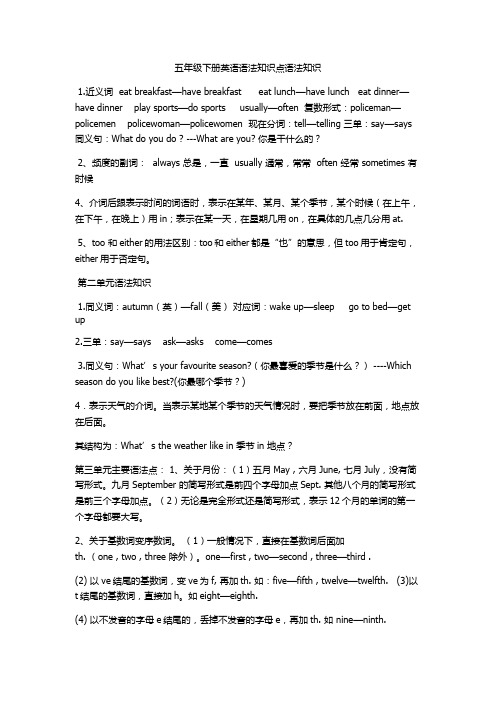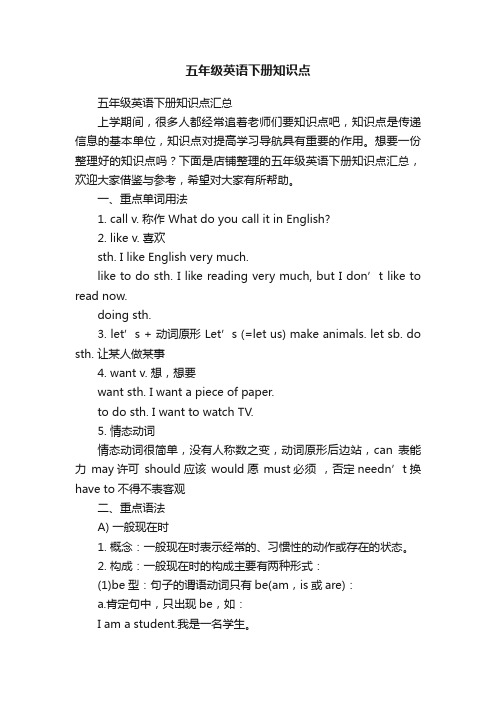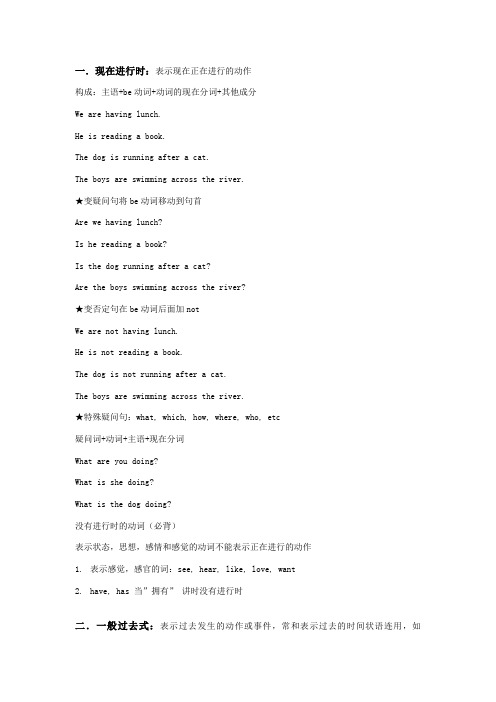小学五年级英语下册语法
小学五年级英语下册《Unit 3》重点必背句型分类归纳

—— It’s inJune.它在六月。
8.——When is thesummer vacation?暑假在什么时候?
——It’s inJulyandAugust.它在七月和八月。
9.——When isTeacher语下册《Unit 3》重点必背句型
※※※※※※※※※※※※※※※※※※※※※※※※※※※※※
重点句型一
——When is +节日/事件?
——It’s in +月份。
课本摘抄必背同类句型:
1.—— When isTree Planting Day?植树节在什么时候?
—— It’s inMarch.它在三月。
2.—— When is theNew Year’s Day?新年在什么时候?
—— It’s inJanuary.它在一月。
3.——When is thewinter vacation?寒假在什么时候?
—— It’s inJanuaryandFebruary.它在一月和二月。
4.——When is theEnglish party/sports meet?英语派对/运动会在什么时候?
—— It’s inApril.它在四月。
5.—— When is thesinging contest/school trip?歌唱比赛/学校旅行在什么时候?
—— It’s inMay.它在五月。
6.—— When isMay Day/Mother’s Day?五一劳动节/母亲节在什么时候?
—— It’s inMay.它在五月。
—— It’s inSeptember.
五年级英语下册重点句型

五年级英语下册重点句型基本句型:1. 询问喜欢哪个季节:⑴--- Which season do you like best? 你最喜欢哪个季节?---I like +季节+ best. (例:Ilikespring∕summer∕fall∕winter best)---或:I like summer, because I can swim inthe sea.⑵--- Whatis your favourite season? 你最喜爱的季节是什么?--- Spring∕summer∕fall∕winter is myfavourite season.2. 询问天气:--- What is the weather like in fall inBeijing? 北京秋天的天气是怎么样的?--- It is sunny and cool.3. 询问理由:--- Why do you like winter best? 为什么你最喜欢冬天?--- Because I can play with snow and make asnowman.4. 询问想要做什么--- What would you like to do?--- I’d like to climb∕play sports…… ( I’d = I would )5. 询问具体季节--- What season is it in March in Beijing? 北京的三月份是什么季节?--- It is spring.6. 询问能做什么--- What can I do there? 我在那里能做什么?--- You can go to the Great Wall. 你可以去长城。
7. 询问接下来打算去哪里?( be going to一般将来时)--- Where are you going on vacation? 假期你打算去哪里?--- I am going toCanada. 我将要去加拿大。
人教版五年级英语下册重点句型及语法

人教版五年级英语下册重点句型及语法第一单元1、其他日常活动:eat breakfast 吃早饭 eat lunch吃午饭 eat dinner 吃晚饭get up起床 go to bed 上床睡觉 wash my clothes 洗我的衣服watch TV看电视 go swimming 去游泳 go running去跑步do homework 做作业 do kungfu练武术 play ping-pong打乒乓球play football踢足球 play basketball打篮球 play the pipa弹琵琶play music 演奏音乐 finish class 结束上课 start class 开始上课in the water/sea 在水里/在海里 is good at 擅长 get off 逃脱 lots of 许多2、频度副词。
always总是,一直(100%)usually通常(80%) often 经常(60%)sometimes(30%)有时3、疑问词。
when什么时候 why 为什么 what 什么重点句型。
1、询问别人什么时候做某事的句型及回答。
句型结构:问:When do you+动词短语原形+其他?(你/你们什么时候做某事?)答:I/we(+频度副词)+动词短语原形+at+具体时间(我/我们通常在几点做某事。
)例:问:When do you go to bed?(你什么时候上床睡觉?)答:I go to bed at 9:00p.m (我晚上9点上床睡觉。
)注意:当主语是第三人称单数(he,she,it,单个人名或单数名词)时,助动词do要变成doe s,句型结构是:when does+主语(第三人称单数)+动词短语原形+其他?2、询问别人周末做什么的句型及回答。
句型结构:问:What do you do on the weekend?(你周末做什么?)答:I(+频度副词)+动词(短语)+其他。
五年级下册英语语法知识点语法知识

五年级下册英语语法知识点语法知识1.近义词 eat breakfast—have breakfast eat lunch—have lunch eat dinner—have dinner play sports—do sports usually—often 复数形式:policeman—policemen policewoman—policewomen 现在分词:tell—telling 三单:say—says 同义句:What do you do ? ---What are you? 你是干什么的?2、频度的副词: always 总是,一直 usually 通常,常常 often 经常 sometimes 有时候4、介词后跟表示时间的词语时,表示在某年、某月、某个季节,某个时候(在上午,在下午,在晚上)用in;表示在某一天,在星期几用on,在具体的几点几分用at.5、too 和either的用法区别:too和either都是“也”的意思,但too用于肯定句,either用于否定句。
第二单元语法知识1.同义词:autumn(英)—fall(美)对应词:wake up—sleep go to bed—get up2.三单:say—says ask—asks come—comes3.同义句:What’s your favourite season?(你最喜爱的季节是什么?) ----Which season do you like best?(你最哪个季节?)4.表示天气的介词。
当表示某地某个季节的天气情况时,要把季节放在前面,地点放在后面。
其结构为:What’s the weather like in 季节in 地点?第三单元主要语法点: 1、关于月份:(1)五月May , 六月June, 七月July,没有简写形式。
九月September 的简写形式是前四个字母加点Sept. 其他八个月的简写形式是前三个字母加点。
五年级英语下册知识点

五年级英语下册知识点五年级英语下册知识点汇总上学期间,很多人都经常追着老师们要知识点吧,知识点是传递信息的基本单位,知识点对提高学习导航具有重要的作用。
想要一份整理好的知识点吗?下面是店铺整理的五年级英语下册知识点汇总,欢迎大家借鉴与参考,希望对大家有所帮助。
一、重点单词用法1. call v. 称作 What do you call it in English?2. like v. 喜欢sth. I like English very much.like to do sth. I like reading very much, but I don’t like to read now.doing sth.3. let’s + 动词原形Let’s (=let us) make animals. let sb. do sth. 让某人做某事4. want v. 想,想要want sth. I want a piece of paper.to do sth. I want to watch TV.5. 情态动词情态动词很简单,没有人称数之变,动词原形后边站,can表能力may许可should应该would愿must必须,否定needn’t换have to不得不表客观二、重点语法A) 一般现在时1. 概念:一般现在时表示经常的、习惯性的动作或存在的状态。
2. 构成:一般现在时的构成主要有两种形式:(1)be型:句子的谓语动词只有be(am,is或are):a.肯定句中,只出现be,如:I am a student.我是一名学生。
b.否定句中,要在be后面加not,如:She isn't a teacher.她不是教师。
c.一般疑问句,要将be放在句子开头(注意句首字母大写),句尾用问号,答语用Yes,主语+be.或No,主语 + be + not.如:—Are you ready?—你准备好了吗?—Yes,I am.—是的,我准备好了。
小学五年级下英语语法总结

一.现在进行时:表示现在正在进行的动作构成:主语+be动词+动词的现在分词+其他成分We are having lunch.He is reading a book.The dog is running after a cat.The boys are swimming across the river.★变疑问句将be动词移动到句首Are we having lunch?Is he reading a book?Is the dog running after a cat?Are the boys swimming across the river?★变否定句在be动词后面加notWe are not having lunch.He is not reading a book.The dog is not running after a cat.The boys are swimming across the river.★特殊疑问句:what, which, how, where, who, etc疑问词+动词+主语+现在分词What are you doing?What is she doing?What is the dog doing?没有进行时的动词(必背)表示状态,思想,感情和感觉的动词不能表示正在进行的动作1.表示感觉,感官的词:see, hear, like, love, want2.have, has 当”拥有”讲时没有进行时二.一般过去式:表示过去发生的动作或事件,常和表示过去的时间状语连用,如yesterday, last night, the day before yesterday, 3 days ago构成:含有be动词的句子,将动词变为过去式,am, is 的过去式为was,are的过去式为wereI was at the butcher’s.You were a student a year ago.The teacher was very beautiful ten years ago.★变疑问句将be动词移动到句首Were you at the butcher’s?Were you a student a year ago?Was the teacher very beautiful ten years ago?★变否定句在be动词后面加notI was not at the butcher’s.You were not a student a year ago.The teacher was not very beautiful ten years ago.★肯定回答/否定回答Yes, I was. / No, I was not.Yes, you were. / No, you were not.Yes, he/she was. / No, he/she was not.★特殊疑问句What did you do?(必背)不含有be动词的句子,将动词变为过去式I finished my homework yesterday.The boy went to a restaurant.The Sawyers lived at King Street a year ago.★变疑问句在句首加did,动词变为原型Did you finish your homework yesterday?Did the boy go to a restaurant?Did the Sawyers live at King Street a year ago?★变否定句在主语和动词之间加did notI did not finish my homework yesterday.The boy did not go to a restaurant.The Sawyers did not live at King Street a year ago.★肯定回答及否定回答Yes, I did. No, I didn’t.Yes, he did. No, he didn’t.Yes, they did. No, they did not.三.过去完成时用法:在过去的时间里,两个动作中,发生在前的那个动作要用过去完成时。
外研社小学英语一起小学5五年级下语法总结及练习题

外研社五年级下语法总结及练习题I. 一般现在时A. 功能:1.表示事物或人物的特征、状态。
如:The sky is blue.天空是蓝色的。
2.表示经常性或习惯性的动作。
如:I get up at six every day.我每天六点起床。
3.表示客观现实。
如:The earth goes around the sun.地球绕着太阳转。
B. 构成:1. be动词:主语+be(am, is, are)+其它。
注意:(我用am,你用are,三单is,复数are。
)肯定句:主语+be+其它. 如:He is a worker. 他是工人。
否定句:主语+ be + not +其它. 如He is not a worker.他不是工人。
一般疑问句:Be +主语+其它? 如:Is he a worker?特殊疑问句:疑问词+一般疑问句? Where is your bike?2.行为动词:主语+行为动词(+其它).如:We study English.我们学习英语。
注意:(当主语为第三人称单数(he, she, it)时,要在动词后加"-s"或"-es"。
如:Mary likes Chinese.玛丽喜欢汉语。
肯定句:主语+动词原形(+其它). 如:I like bread.否定句:主语+ don't( doesn't ) +动词原形(+其它)。
如:I don't like bread.当主语为第三人称单数时,要用doesn't构成否定句。
如:He ofter plays football. He doesn't often play football.一般疑问句:Do( Does ) +主语+动词原形+其它?如:Do you often play football?- Yes, I do. / No, I don't.当主语为第三人称单数时,要用does构成一般疑问句。
五年级下册英语知识点总结归纳

五年级下册英语知识点总结归纳五年级下册英语知识点总结归纳成功需要成本,时间也是一种成本,对时间的珍惜就是对成本的节约。
接下来店铺为大家编辑整理五年级下册英语知识点总结归纳,希望对大家学习英语有所帮助。
五年级下册英语知识点:名词这里强调两点:不可数名词都默认为单数,所以总是用is或者was。
单数名词表示一个可数事物。
复数名词表示两个或两个以上的可数事物。
1).规则变化①一般在名词后加s.如boy→boys, pen→pens等。
②以s, x, sh, ch结尾的,在后面加es.如bus-buses, box-boxes, brush-brushes, watch-watches.③“以辅音字母+y”结尾的,y变为i,然后再加es.如baby→babies.④以f或fe结尾的名词把f或fe改为v, 再加es. 如knife, half, leaf, wolf等。
⑤以o结尾的名词,除tomato, potato等少数在后面加es外,一般是在后面直接加s.如kilo→kilos,photo→photos,zoo→zoos, radio→radios, piano→pianos, video→videos.2).不规则变化man→men, woman→women, foot→feet, tooth→teeth,,child-children,mouse→mice单复数形式相同如:sheep→sheep, deer→deer, Japanese→Japanese, Chinese→Chinese等。
有些名词形式上是单数,实为复数意义,通常被称为复数名词,如:people, police等。
由-man和-woman构成的合成词如:policeman→policemen, Englishman→Englishmen,Englishwoman-Englishwomen但German不是合成词,故复数形式为Germans.另外被man 或woman 修饰的'名词变复数时,两个名词都要变。
- 1、下载文档前请自行甄别文档内容的完整性,平台不提供额外的编辑、内容补充、找答案等附加服务。
- 2、"仅部分预览"的文档,不可在线预览部分如存在完整性等问题,可反馈申请退款(可完整预览的文档不适用该条件!)。
- 3、如文档侵犯您的权益,请联系客服反馈,我们会尽快为您处理(人工客服工作时间:9:00-18:30)。
一、词语1、名词这里强调两点:不可数名词都默认为单数,所以总是用is 名词复数如何加后缀:各种不同情况变化方法例词一般情况: 1)直接加-sbook-books bag-bags cat-cats bed-beds 以s. x. sh. ch2)结尾加-esbus-buses box-boxes brush-brusheswatch-watches peach—peaches glass--glasses3)以“辅音字母+y”结尾变y为i, 再加-esfamily-families study--studies4)以“f或fe”结尾 ,变f或fe为v,再加-esknife-knives不规则名词复数man-men woman-women policeman-policemen policewoman-police women mouse-mice foot-feet child-children fish-fish Chinese-C hinese英语下册知识点总结一、重点短语讲解1.play with 和…一起玩,play with sb.(某人)和…一起玩,play with sth.(某物)玩某物eg. Lucy and Lily are playing with their mother.Lucy and Lily are playing with their doll.2.a lot of 很多a lot of =lots of+可数名词复数或不可数名词eg. 同义句转换There are a lot of apples on the table.=There are apples on the table.3. how often 多久一次,how often 是一个特殊疑问词,就频率提问。
英语表示频率的词:一次:once 两次:twice 特殊其他次数:基数词+times 构成例如:8次eight timese.g. --How often do you go to the library?I go to the library once a week.(注:如就划线部分提问,应用特殊疑问词how often)4.how many 多少,how many/much 就数量提问.how many+可数名词;how much +不可数名词e.g.-- How many boys are there in your class?There are 40 boys in my class.How much water is there in the bottle? There is a little water in the bottle.5.be good at擅长at后可加名词或动词。
如加动词,应用动名词形式即:v + ing e.g.I am good at English.6.be interested in对….感兴趣in后可加名词或动词。
如加动词,动词应用动名词形式即:v + ing e.g. I am interested in English .7.play the violin拉小提琴,乐器前加定冠词the8.listen to music听音乐, 听…,用listen to1)听音乐前不加定冠词the;2) 听收音机前,要加定冠词the :listen to the radio .e from 来自,come from=be from ,I come from China. =I am from China.易错点:Where are you come from? (错误) Where do you come from? (正确)10. play football 踢足球{球类名词前不加冠词}11.be famous for因…闻名12. have a look at 看一看have a look at =look at13.how much 多少(钱),how much 用来询问价格14.a pair of 一双,一对;a pair of glasses, a pair of trousers15. try on 试穿试穿鞋子try on the shoes=try the shoes on; 试穿它,此处它是代词,只能放在try on之间try it on16.see a doctor看医生常用表示“看”的单词有:watch; see; look; read ;watch:用于看电视,比赛等;watch TV, watch football match see: 看见强调结果,看到什么;看电影、看医生时用see a film; see a doctor17. take good care of好好照顾take (good) care of=look after18. have a fever发烧have +表示症状的单词have a fever; have a toothache; have aheadachehave +病名have measles (麻疹) have mumps (腮腺炎)19. have to不得不Eg: Her mother is ill, she has to look after her mother, so she can’t come to the party.重点:含有have to的句子变否定用don’t doesn’te.g. She has to finish her homework.变否定句为:She doesn’thave to finish her homework. (正确)20. worried about 担心She worried about her exam.21.help with帮助…做某事help with =help sb (to) do sth.Eg: Peter helps her mother with the housework .=Peter helps her mother (to) do the housework.二、重点单词用法1.call v称作What do you call in English?2.Like v 喜欢1)like sth. I like English very much2)like to do sth.I like reading very much, but I don’t like toread now.3)like doing sth. 动词原形3.let’s +动词原形Let’s (=let us) make animals. let sb. do sth. 让某人做某事4.want想,想要1)want sth. I want a piece of paper.2)want to do sth. I want to watch TV.5.情态动词情态动词很简单,没有人称数之变,动词原形后边站。
can 表能力;may许可;should 应该;would 愿;must必须,否定needn’t 换have to不得不表客观三、重点语法A)一般现在时1.概念:一般现在时表示经常性、习惯性的动作或存在的状态。
2.构成:有两种构成形式(1)b e 型句子的谓语动词只有be(am,is,are)a 肯定句中,只出现be :I am a student.我是一名学生。
b.否定句中,要在be 后面加not,如:She isn't teacher.她不是教师。
c.一般疑问句中,要将be 放在句子开头(注意句首字母大写),句尾用问号,答语用Yes,主语+be.或No,主语+be +not如:Are you ready?—你准备好了吗?—Yes,I am.—是的,我准备好了。
No, I’m not. 我没准备好。
)(2)实义动词型:句中的谓语动词为实义动词(也叫行为动词):a.肯定句中,只出现实义动词,如:I get up in the morning.我早晨起床。
b.否定句中,要在实义动词前面加do(does)+not,do(does)作助动词,本身无意义,常与not 缩写成don't (doesn't),如:I don't like vegetables.我不喜欢蔬菜。
c.一般疑问句,要在句子开头加助动词Do(does),句尾用问号,简略答语用Yes,主语+do(does).或No,主语+do(does)+not.如:—Do you like oranges?—你喜欢桔子吗?—Yes,I do.—是的,我喜欢。
3一般现在时的用法1)经常性或习惯性的动作,常与表示频繁度的时间状语连用。
时间状语:every…, sometimes,Eg:I leave home for school at 7 every morning.2)客观真理,客观存在,科学事实。
The earth moves around the sun.Shanghai lies in the east of China.3)表示格言或警句中。
Pride goes before a fall.骄者必败。
注意:此用法如果出现在宾语从句中,即使主句是过去时,从句谓语也要用一般现在时。
例:Columbus proved that the earth is round .3)现在时刻的状态、能力、性格、个性。
I don't want so much.Ann Wang writes good English, but does not speak well.B)一般将来时1.概念:表示将要发生的动作或存在的状态及打算、计划或准备做某事。
句中一般有以下时间状语:tomorrow, next day(week, month, year…),soon, the day after tomorrow(后天)等。
2.基本结构:①be going to+ do.②will+do3.否定句:在be动词后面加not或在will后面加not 成won’t。
例如:I’m going to have a picnic this afternoon.否定句为:I am not going to have a picnic this afternoon.4一般疑问句:be或will 提到句首,some改为any, 改为or,第一二人称互换。
例如:We are going to go on an outgoing this weekend. Are you going to go on an outgoing this weekend?四、对划线部分提问。
